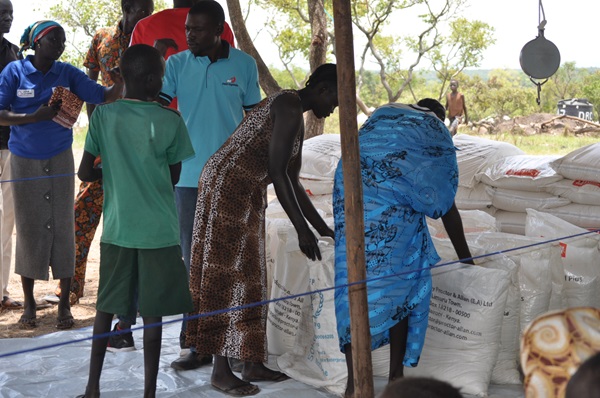Akot escaped South Sudan on foot. She walked for over two weeks, hiding from rebels before arriving at the Uganda border. She was tired, hungry and all alone.
Akot is a 76-year-old grandmother who now lives in Rhino Refugee Camp. In the camp, ERDO runs a feeding program together with the Canadian Foodgrains Bank as well as a psychosocial program to care for refugees after and during trauma.
Weeks after Akot arrived, I visited the camp as ERDO’s director of programs. Speaking with Akot, I learned that three of her children were killed in the civil conflict and one fled to Ethiopia. She doesn’t know where her last son is. Akot told her story with a distant gaze in her eyes. She resigned herself to her life. She had no hope.
Akot is one of 4.3 million people displaced from South Sudan. Sixty-three per cent are children under 18. South Sudanese refugees are among 70 million displaced peoples worldwide. Looking at these statistics, it is easy to see a hopeless world.
But God cares for the hungry, the outcast, and the widow.
Our God is deeply involved in the everyday affairs of humans. He intimately knows the cry of the oppressed, the stranger, and the orphan. His call to His people, the church, is to be relevant to the needs of the poor and the marginalized. He calls us to see past the sorrow of this world and to birth hope around us.
The mission of the church, therefore, is a prophetic one.
In Hebrews it says, “These all died in faith, not having received the promises, but having seen them afar off were assured of them, embraced them and confessed that they were strangers and pilgrims on the earth” (Hebrews 11:13, NKJV).
The prophetic mission of the church is to embrace others, realizing we are all foreigners and strangers, all marginalized people. It is too easy to become numb to poverty. But without grieving with the poor and the marginalized, we have not earned the right to reach out to them.
To be relevant to the poor, it is fundamental for the church to learn the discipline of prophetic grief. Like Habakkuk, desperately crying out to God about injustice, the conditions of the poor must break our hearts.
Prophetic grief goes far beyond crying and weeping. It feels deep sorrow but sees hope beyond the pain. Prophetic grief plants gardens of healing in the midst of injustice. It declares to the world that love is stronger than hate and God’s power is greater than our pain.
When we grieve prophetically, we should be led to submission, understanding that only God can lift our grief.

Submission means choosing not to act in our own strength or control the situation, even when it is within our power. We choose to come under God’s authority and wisdom. Giving up our plans, we deny ourselves the power of our privilege, letting God direct our response to the situation.
“Many are the plans in a person’s heart, but it is the LORD’s purpose that prevails” (Proverbs 19:21).
When the local church, with all of its inadequacies, submits to God, we recognize Him as righteous and sovereign. It is God who charts the course of countries and holds the rulers of the earth in the palm of His hands. Our God has the final say in the affairs of nations.
When we submit our plans to God, we learn what it means to live by faith.
Instead of expecting instant results and chasing after momentary gratification, the church needs to remind people that God is our strength. We look to Him for hope rather than our plans or our circumstances. We do not put our trust in hopeless statistics. We put our faith in God.
When we work with the poor and the marginalized, we must realize we are not working in isolation. God is already at work though systems, governments, and the private sector to address poverty. When we collaborate, we can do so much more to help the poor.
I returned to Uganda in 2019 and met with Akot again. Now in her third year at the camp, she has found faith and community. PAG Uganda planted a church nearby, and local pastors visited with the refugees. Akot received trauma counselling and encouragement in her walk with the Lord.
Habakkuk concludes his exploration of injustice with this thought: “Though the fig tree does not bud and there are no grapes on the vines … yet I will rejoice in the LORD, I will be joyful in God my Savior” (Habakkuk 3:17-18). Although the statistics are daunting and the need is great, we can bring hope to the hopeless by pointing to a sovereign God who cares for each and every hungry person.
Akililu Hunqe is the former director of International Programs for ERDO.
This article appeared in the April/May/June 2020 issue of testimony/Enrich, a quarterly publication of The Pentecostal Assemblies of Canada. © 2020 The Pentecostal Assemblies of Canada.